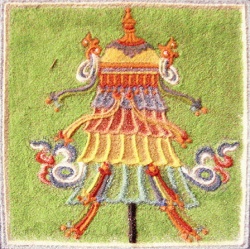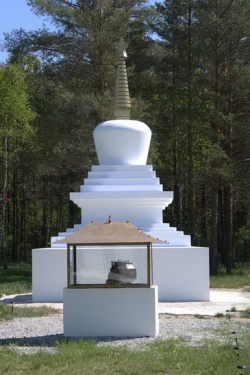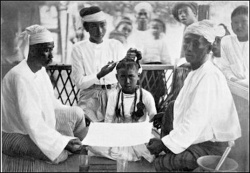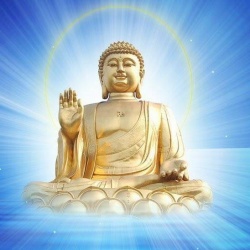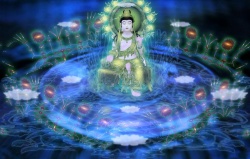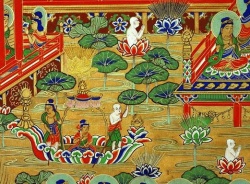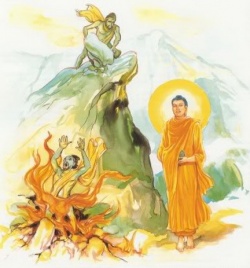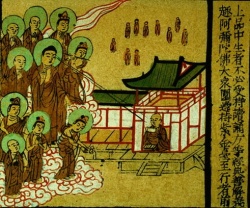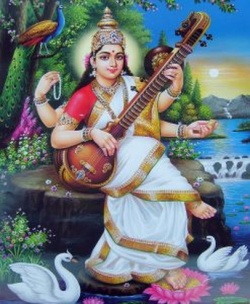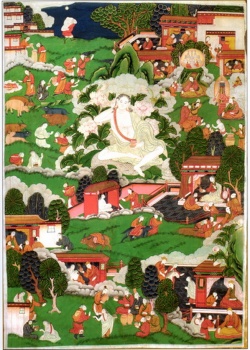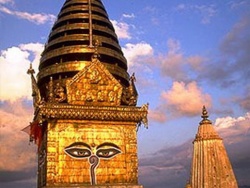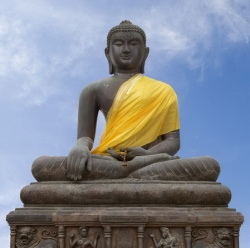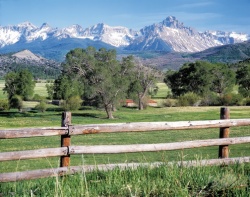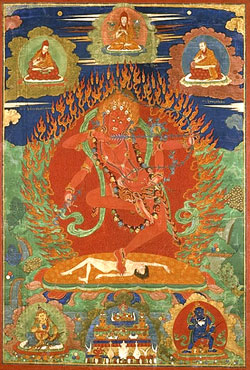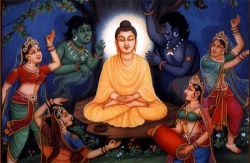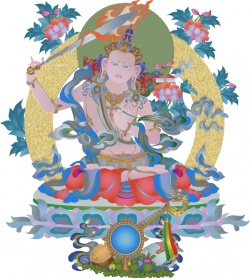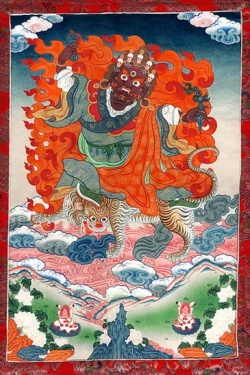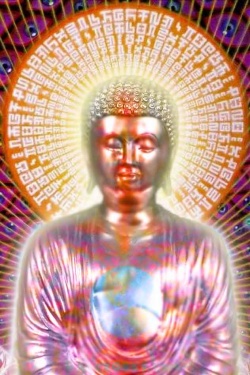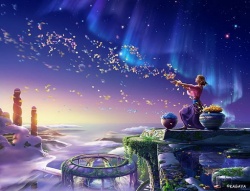Bardo ; Viorica Doina Neacsu
Viorica Doina Neacsu
I am honest interested in your opinion about the content of this post and i would like to talk about Bardo.
Jackson Peterson 2 March 11:19
"The notion of the bardo is a mental construction, and is therefore empty. So don't be concerned.
The notion of terrifying lights and sounds appearing that seem to threaten one's mental body in the bardo; are just empty mental constructions of one's own mind. So don't be concerned.
The appearances of the Five Lights and a "someone" who needs to recognize them; are just empty mental constructions of one's own mind. So don't be concerned.
The appearances of wrathful and peaceful deities are conceptually believed empty appearances of mind. So don't be concerned.
The notion of a "someone" who must recognize the Clear Light of the Dharmakaya is also just an empty construction of mind. So don't be concerned.
You have never moved from the Natural State and therefore all bardos are empty appearances that offer no benefit or harm. So don't be concerned.
You have never entered into the realms of the Six Lokas: the Six Lokas are themselves as empty as a mirage. So don't be concerned.
Remaining free of all beliefs about the substantial existences of all and everything; rest freely in your own Natural State without the least trace of concern."
Viorica Doina Neacsu I am curious about what others have to say about this post, i was thinking many times how that bardo can happen... it is true that the mind is leaving the body after the brain dies, but for bardo to happen i think it is needed longer time... That first affirmation of Jackson is my interest.
The 'no one to do anything' line of logic, demonstrated here by Jackson's use of scare quotations around 'someone' is really elementary reasoning when it comes to traditions such as Dzogchen and so on. His contention that one has 'never moved from the natural state', and have never 'entered into the realms of the six lokas' is also presented in a counterproductive manner, in my opinion.
If we examine this through lens theory the logic is sound. You just have to evaluate the statements through the context of "never moved from the Natural State" and the rest of it is true.
There are no absolute truths, only contextual truths. Rather than blatantly disagreeing with others we can see if there is a lens where it makes sense.
At any rate Viorica, the difference lies in recognizing these things, as much as Jackson would like you to believe recognition is impossible because there is 'no self' to recognize, that isn't the case. There's never been a self at any point in time, the 'self' is just a conventional label, yet recognitions of all types occur all the time. Myriad types of activities are performed everyday, the 'absence' of an inherent self does not obstruct those activities, for that would be impossible. In the same way the absence of an inherent self is not going to obstruct the possibility of recognition or realization.
From a meditative development perspective, it may be useful to ask if we have the insights that allow a certain lens to make sense. If not, then perhaps that is a direction we can develop.
Some of you are so damn sure you are correct...I hope I never find myself in your position, everything black and white, upholding the "truth". Best of luck with that!
Kyle Dixon Kyle Dixon Justin, you're correct that the basic notions Jackson is attempting to convey are fundamentally sound, however it is the way in which he is attempting to get that point across that is utterly unskillful. You cannot simply deny these things outright, it is a given that they are all empty and therefore ultimately lack inherent existence. However denying them is such a nonchalant manner is really counterproductive, the idea is that one should seek to directly recognize the emptiness of these things. But if they are denied in the very beginning as being without merit, then what will ensue is that the mind will grasp at those notions, and these things will simply be swept under the rug without any genuine insight about them.
Kyle Dixon Brian, I'm not saying I'm correct, I'm merely critiquing the manner in which these points are being communicated. This is an old argument though, and I'm far from the only one who feels this way.
It just doesn't make for a very easy path for people. As was mentioned by someone else today, some people (most people) require some sense of a gradated approach to insights of this nature. Otherwise you take someone who hasn't learned to swim and you throw them overboard and leave them to work it out for themselves. So it is the skillful aspect of dealing with such notions that is the point of contention.
It isn't really that the mind leaves the body etc., but it apparently seems that way. The mind isn't really a something that can transition from one place to another, so really all that is occurring is a continuum of appearances that the mind grasps at in the wrong way, and interprets as a process. In that sense Jax's insight is correct, that it is all a construct of the mind, but the mind cannot understand that. Just like the mind cannot simply grasp that this reality here is unreal, it has to be directly recognized and realized, and through that realization it is then properly understood.
So when Jax says that the bardo is unreal and not to worry about it, and then proceeds to state that there is no realization that occurs either, then he sends you up the river without a paddle.
Viorica Doina Neacsu I am surprised regarding about this Bardo because on one hand it is a book about how to die and teachings about Bardo... on the other hand if one realizes his true nature, what Bardo can be there? Even if one is not realized, when that Bardo is happening? In few minutes?
( Kyle, i copy my messages from pms and if you copy yours people would understand our conversation and would join, maybe )
Kyle Dixon Full realization is required for there to be no bardo at death. In Dzogchen upadeshavarga practices for example, if completed, the student goes through the bardo prior to what we would interpret as 'physical death'.
Ah! So if bardo is passed what happened at death?
n Parinirvana occurs in the completion of the path.
For example, this definition: [[Parinirvana is the final nirvana, which occurs upon the death of the body of someone who has attained complete awakening (bodhi). It implies a release from the bhavachakra, Sa?sara, karma and rebirth as well as the dissolution of the skandhas.
For the individual who has completed the upadeshavarga practices that take them through the bardo, death occurs at the completion of those practices (due to the elements which constitute samsaric experience being fully reverted back to their basic expression), which is the meaning of the 'result' in Dzogchen being one of the various forms of death:
(i) The rainbow body [jal us], (ii) The body of atoms lus rdul phran du dengs, (iii) The body of light (often called rainbow body as well) od phung, (iv) Great transference (or total transference) pho ba chen po.
Brian Zey My comment was not directed at anyone and I only posted it in this thread as I didn't feel it needed it's own. Interesting you feel it was directed at you. Do you feel it applies to you Kyle Dixon?
Kyle Dixon Brian, sure! There weren't too many of us speaking with conviction in the thread, really only two of us to choose from in that respect.
Kyle Dixon Nicholas, yes the teachings say that samsara and nirvana are not outside of the mind.
Nicholas Mason Point being that the whole issue here is a nonstarter because realization is mind.
Nicholas Mason They teachings do not say that samsara and nirvana are or are not anywhere in particular. They say samsara and nirvana are Mind. If one adopts this attitude, that they are Mind, then the self-reflexive nature of consciousness takes care of itself.
Kyle Dixon Samsara and nirvana conventionally apply to the individual in question, but the release from mind is the liberating factor because it is the cessation of ignorance. We simply term that release 'nirvana'.
'Liberation' only applies to the conventional entity which was allegedly caught in the midst of confusion. The release from confusion reveals the unreality of the entity, and with that the varying implications of that misperception are also exhausted.
This is why you see statements such as the buddhas have liberated countless beings from time immemorial, without any being having ever been liberated.
Lindsay Funk Kyle can you point me to any elucidations of parinirvana? One thing I'm wondering is if there's still something like a mindstream? Is there still experience?
Kyle Dixon Nicholas, what it says is that samsara and nirvana are non-dual from the standpoint of awakened wisdom.
Nicholas Mason That too. Why are you so interested in the realization of others?
Kyle Dixon Lindsay, parinirvana usually applies to the death of the physical body, you'll see statements such as such-and-such a master's parinirvana occurred on X date. With the process that occurs in the aforementioned practices though, the constituent elements of the body etc., are fully reverted to their basic expression as the five wisdom lights. So that is the full measure of the non-arising of the body, and the exhaustion of the related karmic propensities which would serve to reinforce the further arising of a body.
From that standpoint an individuated mind stream is known to be non-arisen, and since non-arisen appearances do not cease I believe it is said that the continuum remains. It is just that there is no longer any delusion regarding the nature of that capacity, and without karmic propensities to influence and cause further arising, the dynamism of wisdom continues to express itself, unoriginated and unceasing.
Something alluded to here by Longchenpa:
"At no time throughout the beginningless succession of lifetimes has there ever been an actual birth. There has only been the appearance of birth. There has never been actual death, only the transformation of appearances like the shift from the dream state to the waking state... throughout the beginningless succession of lifetimes there has never been any actual experience of transition or going from one state to another, or any actual experience of being located in some other place. This is analogous to the images in a dream."
This is also the case for us right now, but due to being afflicted by delusion and karma we cannot see this.
As elucidated in this account of Kunzang Dechen Lingpa:
"Later when Rinpoche was relaxing in a lawn chair, he said to a few students gathered around him: 'You don't realize this, but I am actually Guru Rinpoche and you are his twenty-five disciples. I have reached the stage of exhaustion of phenomena (cho nyi zepa). In truth there is for me no form, no sensation, no perception, no karmic formation, no consciousness, no form, no smell, no sense consciousness or object of sense consciousness and so forth; there is no self or other and no distinction of 'Buddhas' and 'sentient beings'; everything remains in the naturally perfect state of pure equality. From the depths of my heart I wish there were some way you could all be made to understand the truth in this, but you do not see it.'
Then Rinpoche went silent and tears fell from his eyes."
Kyle Dixon Nicholas, I didn't know I was (in the way you appear to be insinuating I am).
Kyle Dixon At any rate, as you can see there are multiple meanings behind the notion of the bardos. On one hand it implies a cyclical process of birth and death and the various transitional states which occur in that unfolding.
On the other hand it is a description of practice, and is then brought down to the circumstances which apply to the individual in this very life. In that sense these bardos are occurring in every instance, and simultaneously depending on our condition, for they are the processes which give rise to the appearances of samsara and nirvana.
Dzogchen Ponlop Rinpoche:
"We search for the beginning of samsara. However, Buddha said many times that it is useless to search history to find it. He said that there was not much benefit in knowing. Knowing when or how samsara started is not going to really help us to undo it. Therefore Buddha concentrated mainly on the path that can undo it, rather than going into the history and so forth.
It's like the big-bang theory. Scientists spent years and years and years finding out how the universe started. The only theory they came up with is just a big bang. That doesn't really help us much. Even scientifically, it doesn't help much. A big bang is a big bang.
Logically speaking, the answer is to look at this very moment: samsara begins right here. We don't have to trace back a hundred years, a thousand years, or a hundred eons. We can trace back the beginning of samsara to this very moment. From the Tantric, Mahamudra, and Dzogchen points of view, it is the beginning of our samsara and it could be the end of our samsara. At this very moment, the basic state of mind is intrinsically pure in that state of great clarity. However, we're not seeing it. Instead, there is the continuous pattern of ignorance and the other delusions that we have discussed."
Viorica Doina Neacsu Interesting... Byron Katie was saying the same thing very often, maybe every 5 minutes... She used to say that we are lucky because we can start again now, and now, and now... we die and we are born in every moment... I don't know if she was reading Buddha's teachings but so many things are similar...
Whoaaa! So bardo what can be other than it is in every moment? When i feel gratitude, love, peace, all is expanding. When i believe a stressful thought all is contracted and suffering is arising... the more i suffer the more i create karma for future sufferings... I think for this reason Sogyal Rinpoche in "Advice for the Moment of Death" is saying in the moment of death to be grateful, in peace, in love, no matter if we were bad people in our life... Interesting... and logically...
1
Lindsay Funk Thanks, Kyle. That helps. Maybe I'm getting too speculative here, but parivirvana would also preclude rebirth in subtler realms than a physical body, right?
I recently dropped into what seemed like a foretaste of some of this stuff, and it was disorienting, to say the least. Not a problem. It just didn't seem like experience and some thread of continuity would ever cease. I had assumed that parinirvana ended this, but now I see it probably isn't this way.
For the curious...
On a bit of a tangent, I recently listened to a BATGAP interview with Kristin Kirk. She seems to have become deeply aware of past lives, realms, and 'the space between lives'. This awareness opened up outside of traditional disciplines (in this lifetime). A couple years ago I would have thought it sounded flakey, but now it's perceived as remarkably tuned in.
Kristin Kirk experienced an initial awakening in 2003 which revealed healing gif... See More
Viorica Doina Neacsu Ha! Three days ago a friend told me to watch this video and i didn't... now i will watch ! hahahaha
Kyle Dixon Lindsay, parinirvana is just physical death of a buddha and the dissolution of the elements which occurs at death.
The reason the result in Dzogchen and systems of the like (which revert the elements) can be referred to as 'parinirvana' is because of the total dissolution of the elements which occurs via the aforementioned practices while the so called organism is still clinically alive.
Kyle Dixon The Bardo Root Verses by Padmasambhava:
Homage to the conquerors, the peaceful and wrathful deities.
Here are the root verses for the six bardo states.
Kyema (kye ma), now that the bardo of this life dawns upon me,
I will stop being lazy and wasting my life,
But instead enter the path of undistracted learning, reflection and meditation.
While training in appearances being mind, I will refine my realization of the three kayas.
Now while I have this once found a precious human body,
It is not the time to squander it on distractions.
Kyema, now that the bardo of dreaming dawns upon me,
I will give up the corpse-like, careless sleep of ignorance,
And instead rest in the natural state of undistracted presence.
By capturing the dreams, I will train in magical transformations and luminosity.
Instead of sleeping like an animal,
I will treasure the practice of mingling luminosity with deep sleep.
Kyema, now that the bardo of meditation dawns upon me,
I will cast aside all types of deluded wandering,
And instead enter the boundless state of undistracted nonclinging.
I will attain steadiness in both development and completion.
Now while I practice one-pointedly, having given up activities,
I will not get caught up in deluded emotions.
Kyema, now that the bardo of dying dawns upon me,
I will cast aside all attachments, clinging and fixation,
And instead enter the path of remembering the instructions undistractedly.
I will suspend my mind in the nonarising expanse of space,
And when about to separate from the material body of flesh and blood,
I will know it to be an impermanent, magical illusion.
Kyema, now that the bardo of dharmata dawn upon me,
I will cast aside all feelings of fear and panic
And instead recognize whatever arises as the self-display of awareness.
I will recognize it all to be the nature of the bardo.
When the crucial time befalls me
I shall not fear the peaceful and wrathful deities, my self-display.
Kyema, now that the bardo of becoming dawn upon me,
I will keep my mind focused on the single goal
And stay firmly connected with the force of my good karma.
I will remember to block the wombs and to turn back from them.
Since this is a time to persevere and keep pure perception,
I shall cast aside envy and instead visualize the guru with consort.
With the insensitive attitude that there is plenty of time,
While striving and struggling at the pointless aims of this life,
If I now return empty-handed, I shall have confused my goal.
Since the sacred Dharma is my main priority,
Shouldn’t I rather practice the Dharma right now?
Since this is what my gracious guru taught me,
If I don’t keep his instructions in mind,
Won’t I just be fooling myself?
This completes the root verses for the six bardos.
From Padmasambhava’s Liberation Through Hearing in the Bardo, revealed by the tertön Karma Lingpa.
Joel Agee Kyle, would you consider the statements in the OP to be unskillful if addressed to someone who has recognized rigpa, or vidya?
Kyle Dixon Probably depends on the individual. Recognition of rigpa is really the beginning of the path and doesn't mean we are completely free of karma or delusion.
The bardo may be empty, but the teachings stress preparation for death and the bardo, whether through phowa or dream yoga and so on. It is said if one cannot maintain lucidity in sleep there is really little hope in maintaining lucidity in the bardo.
Overall yes the bardo is empty and unreal, but this experience right now is also empty and unreal. Easy to say that, but is that our experience? Are we in recognition of that? So the same principle applies to the bardo, even for those who have recognized rigpa because the mere recognition of rigpa does not mean that knowledge is complete. Tulku Urgyen Rinpoche compares the recognition of rigpa to a seed. We cannot say the seed is equivalent to the plant which it gives rise to, but if the right circumstances are present then that seed can germinate and turn into a plant. The same goes for our recognition, mere recognition is not enough, rigpa must be trained and if we fail to train our rigpa then the result will not flower. While on the path we must be mindful of our relative experience, mindful of karma, mindful of cause and effect. When resting in the natural state we are of course free of incurring new karma, but as beginners we are not able to rest in the natural state at all times. So we must keep perfect conduct.
Back to the bardo though; Traditionally the teaching says that the bardo is unreal and the display of the bardo is your own appearances. So if you do not recognize that wisdom in this lifetime, then the bardo is another opportunity for that recognition to occur. The message is never to disregard these things, or not to be concerned, but to be mindful of it and if worse comes to worst, be prepared to take advantage of the bardo as a support for recognition.
His statement that 'appearances of the Five Lights and a "someone" who needs to recognize them; are just empty mental constructions of one's own mind' is not the type of message that the system seeks to instill. In fact quite the opposite. Recognition of the five lights means you recognize rigpa, which is a corner stone of the teaching. If you do not recognize the lights, you mistake them to be subjective and objective phenomena and they are reified into our afflictive experiences as sentient beings. So while the individual who recognizes is simply a convention, that recognition still occurs, and that recognition is the beginning of the path.
The part about never moving from the natural state is also misleading. The aspect that never 'moves' and is never afflicted is our nature. Our dharmata is never sullied or tarnished, but the point of the teaching is to recognize that dharmata. Phenomena [[[dharmins]]] are never separate from their dharmata, our mind (citta) is never apart from the nature of mind [cittata], but the point is to recognize that nature. It is of no use to simply say your nature is originally pure and perfect, there's no liberation in merely hearing that and if there was, then I would understand the statement 'so don't be concerned'. Not that I'm advocating that people should be concerned, that isn't helpful either, but we should be mindful that this system is predicated on recognition and non-recognition. There is one basis (wisdom), and two paths (recognition and non-recognition). The fact that wisdom is self-perfected doesn't mean anything if we aren't in recognition of wisdom.
As for the six lokas (or six realms of samsara), while it is true that samsara is empty and unreal, when under the influence of delusion samsara is all that we know. So it isn't particularly helpful to simply say none of it is real 'so don't be concerned'. Again this comes back to recognition, if we are in recognition of our nature then yes that unreality is intimately apparent, but when we are not in recognition of that nature then simply taking refuge in the idea that it is unreal is little more than an opiate or a nice pat on the back. The teaching doesn't say to take refuge in the mere notion that things are empty appearances and don't be concerned, it says to take refuge in the nature of mind, which means recognize the nature of mind.
Joel Agee Thanks Kyle. I very much appreciate the clarity and thoroughness of your response.
Barry Ryder Reading all the above (yet not the added video) I delight in being able to keep pace. Recognition of concepts is enough for now. I felt obligated to read all to post a familiar favorite.
I appreciate the case made that the bardo occurs every moment and for some it is experienced with awareness yet for us novice it is hidden.
My favorite posting and guide around this is from Sogyal Rinpoche and his description of the bardo as a gap.
And his description as
"very special state of luminosity or Clear Light called . . . the “Bardo of Dharmata"
Sogyal Rinpoche in the Book 'Tibetan Book of Living and Dying,'
states:
What distinguishes and defines each of the bardos is that they are all gaps or periods in which possibility of awakening is particularly present.
How many of us are aware of the changes in consciousness when we fall asleep? Or the moment of sleep before dreams begin? How many of us are aware even when we dream that we are dreaming? Imagine, then how difficult it will be to remain aware during the turmoil of the bardo of death.
There is . . . a vivid correspondence between the degree in subtlety of consciousness we can move through in sleep and dream, and the three bardos associated with death:
> Going to sleep is similar to the bardo of dying, where the elements and thought processes dissolve, opening into the experience of Ground Luminosity.
>Dreaming is akin to the bardo of becoming, the intermediate state where you have a clairvoyant and highly mobile “mental body” that goes through all kinds of experiences. In the dream state too we have a similar kind of body, the dream body, in which we undergo all the experiences of dream life.
>In between the bardo of dying and the bardo of becoming is a very special state of luminosity or Clear Light called . . . the “bardo of Dharmata.” This is an experience that occurs for everyone, but there are very few who can even notice it, let alone experience it completely, as it can only be recognized by a trained practitioner. This bardo of dharmata corresponds to the period after falling asleep and before dreams begin."
Barry Ryder Seems much of Buddhism, other than Zen, is a preparation for our moment of death and the recognition of the Bardo.
To one that is fully awakened, it seems what is being said in this thread, bardo is an unnecessary concept. As it is fully realized. The rest of us can use it as a guide post.
Barry Ryder In the OP second paragraph he speaks of the terrifying lights and sounds as being one's own mental constructs. The same is said about the deities that appear as shown in the Tibetan Book of the Dead, as they can be quite gruesome. Sogyal Rinpoche alludes to looking each in the eye as our mistake is we look to escape and run away missing the opportunity ending up back reborn in this realm.
A thought is that it is a reconstruct of not only our separate ordinary mind yet the totality of all our minds. That would make it more fearsome and a reason to rise above ordinair.
Kyle Dixon It's said for the lay individual that during the death process the pain associated with the dissolution of the earth element causes one's consciousness to 'pass out', and one then later regains consciousness in the bardo of dharmata. Except at that point the display of the bardo is in full swing, roaring sound and wild light, images and so on, which apparently is quite terrifying. A trained yogin/yogini would recognize this display as his or her own, but a lay person mistakes it as external phenomena which causes dualistic vision to arise once again, and the fear associated with the experience causes consciousness to pass out and wake up again repeatedly during this process.
Viorica Doina Neacsu I found this book, Dzogchen Ponlop Rinpoche - Mind Beyond Death.pdf (free download), hope i will find time to read about Bardo
Viorica Doina Neacsu I just read
Taking Light as the Path 188
Taking Sound as the Path 190
Taking Pain and Sickness as the Path 191
Taking Delight and Misery as the Path 193
Taking Emotions as the Path 194
and i think it is a great book.
Discusses the bardo and the cultural customs surrounding it
Kyle Dixon Tibetan Book of the Dead - The Great Liberation: Documentary
Appears to have different content than the film above, also discussing the bardo.
The Tibetan Book of the Dead The Great Liberation
The Tibetan Book of the Dead The Great Liberation
Bardo Thodol: The Liberation Through Hearing During the Intermediate State, it i... See More
Robert Healion strange having died in countless lifetimes we have no knowledge of it,. for my bit I guess when that time comes I will have to deal understand it.
Kyle Dixon On the topic of knowledge of past lives, Soh has shared this before from Daniel Ingram, a highly experienced practitioner, discussing some of his past lives he recalled in deep samadhi, quite intriguing:
"As to world-cycles or the like, my past life experiences line up along the following lines, if you believe in such experiences having validity:
1) This life human.
2) Last life some sort of moderately powerful, clearly somewhat debauched male jealous god/sorcerer of some kind that was stabbed in the back with a dagger by a woman who he had wronged in some way, I think.
3) Some sort of mother skunk-like animal that was eaten by a large black dog or wolf.
4) Some sort of mother bat that was killed when the rock it was clinging to at the top of the cave fell to the floor.
5) Some sort of grim, gigantic, armored skeletal titan-like thing that ran tirelessly through space swinging a gigantic sword and doing battle nearly continuously without sleep for hundreds of thousands of years that was killed by something like a dragon.
6) Some gigantic, gelatinous, multi-tentacled, very alien being living in a very dark place for a very long time, probably under water, I think.
Other than some sense that the skunk-thing and the bat-thing were virtuous mothers, I have no sense that there was any profound previous dharmic development at least back that far, and, in fact, have the distinct sense that the previous one was a bit of a cad and not very ethical. Take that all for what you will.
Kyle Dixon What dictates karma is ignorance. However karma also dictates ignorance. Since karma doesn't really function in relation to anything real, it ultimately doesn't determine anything. The principle of karma also forbids a higher authority which could dictate its processes. Since everything is simultaneously the cause and effect of everything else, there is no place of origin and no beginning.
Source
Wikipedia:Bardo ; Viorica Doina Neacsu
dharmaconnectiongroup.blogspot.com.au
